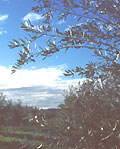There are some 750 million olive trees planted globally and yet olive oil accounts for only 3% of the world's edible oil production and only 5% of that is 'extra virgin' olive oil.
The International Olive Oil Council (IOOC), a body established in 1959 with its head offices in Madrid sets the standards, and in 1995 they made the rules stricter still. Before this date extra virgin simply meant oil produced mechanically without the use of heat, rather than by chemical extraction, and with an oleic acid (free fatty acid) level under 1% (not more than 1 gram per 100grams).
New rules were introduced in 1995 for extra virgin status, oil had to be put through a blind organoleptic analysis by a panel of experts and rated on a 9-point scale with a minimum score of 6.5 to receive extra virgin designation. Organoleptic is an adjective meaning : being, affecting, or relating to qualities (as taste, colour, odour, and feel) of a substance that stimulates the sense organs.
Tony Harvey, the general manager of Ponder Estate in Blenhiem recently attended a workshop in Italy organised by the IOOC on organoleptic analysis, and together with Margaret Edwards of Auckland, they were the only representatives of the new world growers.
"It's really the human side, where you assess the oil by aroma and taste." Mr Harvey said.
"You are looking for a harmonious oil with a nice fruity flavour and a pleasant aroma together with other aspects that define taste. Colour is reasonably unimportant, I mean you would be surprised if it was purple, but unlike wine tasting you are more looking for faults, for example 'off' flavours such as musty, fusty, rancid, metallic and muddy etc."
The Ponder Estate is currently responsible for an estimated 95-100% of New Zealand olive oil exports, and it is labeled extra virgin. It has undergone testing at the Cawthron Institute for oleic acid content and samples last year were sent to Italy and Australia for full analysis.
A panel hasn't been put together in New Zealand yet, these are very early days. However two highly successful training workshops organised by the NZ Olive Association and run by the prominent IOOC accredited olive oil maestro, Dr Luciano Di Giovacchino, were attended by olive enthusiasts from all around New Zealand. From this group a future organoleptic assessment panel can be selected. Margaret Edwards and Tony Harvey have organised informal panel meetings in their areas and other areas around the country to taste New Zealand and imported oils.
"It's more a training exercise to keep ourselves in line with the way we have to go about organoleptic assessment of olive oils."
The expectations for New Zealand oils are very good. "In Europe the production is very traditional, often harvesting sees fruit falling from the trees for collection from the ground over a few days which causes the quality to deteriorate and this carries over into the taste of the oils produced. We are very conscious here that if we harvest in the morning we press in the afternoon or as soon as possible the next day, keeping it fresh. Also our temperatures at harvest time are not as high, and being very much the new kids on the block as it were, all the equipment is sterile, stainless steel and hygienic"
Mr Harvey adds, "We have a brilliant fruit set again this year, Barnea has got a really good heavy crop on it, so has Manzanillo and Frantoio, its great."
